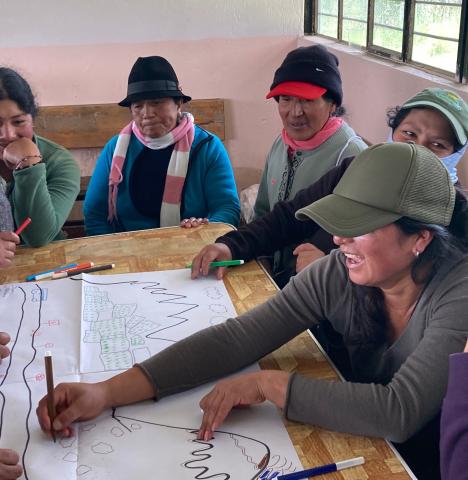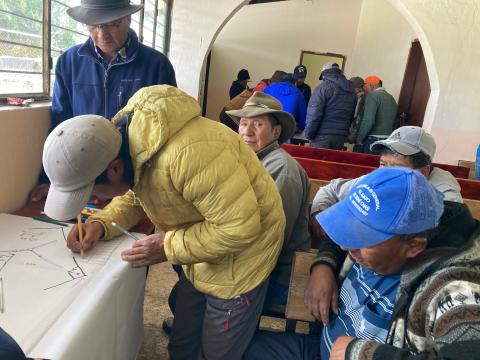Four ecosystem-based adaptation projects with a social and gender perspective begin in Latin America
Four ecosystem-based adaptation projects with a social and gender perspective begin in Latin America
Four CDKN-supported Knowledge-to-Action (K2A) projects began activities recently, two in Colombia (Cuenca Verde and Vivo Cuenca) and two in Ecuador (FONAG and FODESNA). These K2A projects are part of a small grants programme (US$ 50,000 per project) that is being managed by the CDKN Latin America team at Fundación Futuro Latinoamericano (FFLA). The programme was launched in January and supports six Water Funds in total in three Latin American countries (two in Colombia, two in Ecuador and two in Peru). The Water Fund K2A projects aim to sustainably protect natural resources in these countries while considering the effects of climate change and promoting ecosystem-based adaptation (EbA) and gender and social inclusion.
The first of the two K2A projects in Colombia is in the Department of Caldas, a predominantly coffee-growing region in the northwest of the country that also produces avocados. The area is relatively high, with ecosystems ranging from 1,050 metres to 3,600 metres. The Vivo Cuenca Water Fund recently carried out an inception workshop for the K2A project, bringing together communities and local actors in the municipality of Neira, with the aim of gathering feedback on the details of the project. Over the next 18 months, the project aims to implement EbA measures, co-designed with local stakeholders, to support communities in their climate adaptation efforts - using a gender and social inclusion approach - and to ensure the sustainability of the forests and micro-watersheds that supply the town and municipality.

The second K2A project in Colombia, run by the Cuenca Verde Water Fund, focuses on the role of women farmers and how they are using sustainable livestock farming practices. This two-year project is located north of the city of Medellin and will work with women farmers in three municipalities. The goal is to strengthen women’s role in livestock farming by implementing EbA measures that promote sustainable farming practices while also developing the resilience of local ecosystems to climate change. It is hoped that strengthening capacity within a network of women who work in the livestock sector will support production, trade and an exchange of knowledge that can help to both protect watersheds and empower female leaders in the region.
In Ecuador, Quito’s Water Fund, FONAG, recently hosted a K2A project inception workshop with two communities, Santa Ana and Loreto del Pedregal. FONAG introduced the K2A project and explored how these communities can be actively involved in its development. Santa Ana and Loreto del Pedregal are communities from the Mejia canton where climate change is affecting crops, irrigation and agricultural production. The area’s natural ecosystems include páramos (a grassland-shrubland ecosystem found between 3,000 and 5,000 metres above sea level) and the remnants of grasslands, which are vulnerable to climate change. The K2A project is looking to implement EbA measures in the páramos with a gender equality and social inclusion (GESI) perspective. This will be a participatory and long-term process that aims to improve the environment as well as local livelihoods.

The FODESNA Water Fund is implementing the second K2A project in Ecuador. It focuses on promoting the sustainability of the Amazonian chakra (a traditional agroforestry system managed by Indigenous communities) in the Napo province, as a climate adaptation mechanism at the community level. By restoring the chakra system, this project aims to strengthen agro-ecosystem services and sustainable water management practices in the watershed as well as support the livelihoods of local organisations. The K2A project will support the definition of public policy guidelines and strategies, with the aim of advancing environmental governance in the province.
The Water Funds are part of the Andean Water Funds Platform, made up of 10 Water Funds from Colombia, Ecuador and Peru, all of which applied for the CDKN K2A funding. Over the past six months, FFLA has been working with the technical teams of all six selected Water Funds to facilitate discussions and strengthen capacities to design and plan activities that respond to the specific challenges, needs and interests of local actors. They have also helped the technical teams create situational analyses and results chain frameworks, based on their project proposals, using an adapted version of the Conservation Standards methodology (to strengthen the climate change and GESI aspects). These skills should enable Water Fund technical teams to design future projects to apply for donor funding in a manner that responds to local challenges and needs related to climate change and structural inequalities.
